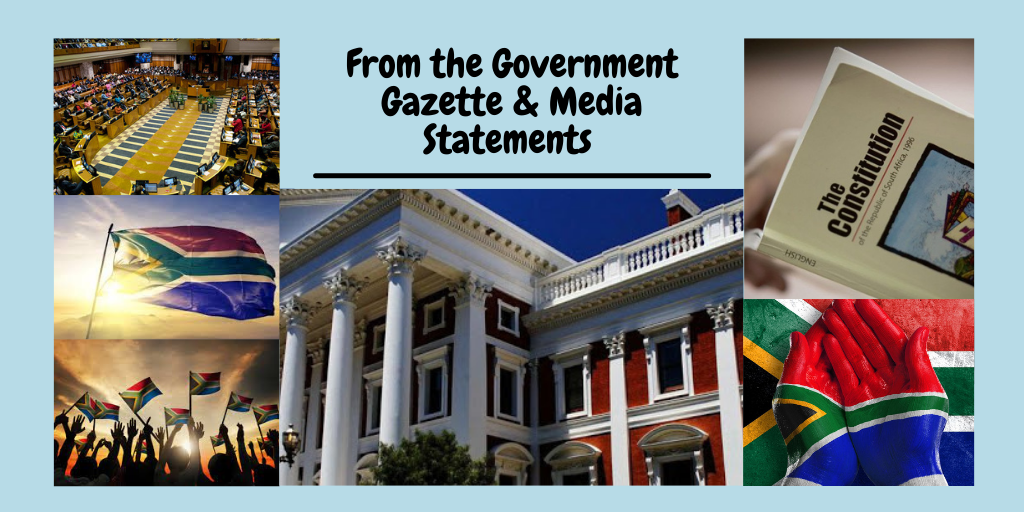13 February 2023
From the Government Gazette and Media Statements (13 February 2023)

KEY BILLS TO BE PRIORITISED THIS YEAR
- In his State of the Nation Address, President Cyril Ramaphosa referred to the following pieces of legislation on which progress is expected to be made during the coming months:
- the Electricity Regulation Amendment Bill (which the President said will be tabled in Parliament ‘later this year’ to ‘transform the energy sector and establish a competitive electricity market’)
- the South African Postbank Ltd Amendment Bill (the President said that, in anticipation of its passing, enactment and implementation, Postbank is already ‘reviewing its service offerings so that it can provide a viable and affordable alternative to the commercial banks’), and
- the draft Public Procurement Bill (which the President said will be finalised, ready for Cabinet approval and tabling in order to ‘address weaknesses identified by the State Capture Commission and improve efficiency, value for money and transparency’).
ENERGY CRISIS
- The State of the Nation Address included a list of steps being taken to urgently address the energy crisis:
- the impact of severe electricity supply constraints was classified as a national disaster by notice in the Government Gazette
- a national state of disaster was declared and gazetted, enabling government to:
- introduce the ‘practical measures’ necessary to ‘support businesses in the food production, storage and retail supply chain’ by facilitating ‘the rollout of generators, solar panels and uninterrupted power supply’
- ‘exempt critical infrastructure such as hospitals and water treatment plants from load shedding where technically possible’, and to
- ‘accelerate energy projects’ and ‘limit regulatory requirements’, nevertheless ‘maintaining rigorous environmental protections, procurement principles and technical standards’
- the Auditor-General will be tasked with ensuring the ‘continuous monitoring of expenditure, in order to guard against any abuse of the funds needed’
- a Minister of Electricity in the Presidency will be appointed to:
- oversee ‘all aspects of the electricity crisis response, including the work of the National Energy Crisis Committee’, and
- ‘deal more effectively and urgently with the challenges’ implicit by working with the Eskom board and management on ‘ending load shedding and ensuring that the energy action plan is implemented without delay’.
- This notwithstanding, the Minister of Public Enterprises will:
- ‘remain the shareholder representative of Eskom’
- ‘steer’ its restructuring
- ‘ensure’ that a ‘transmission company’ is established, and oversee:
- the implementation of the just energy transition programme’, and
- ‘the establishment of the … (state-owned) holding company’
- According to the President, ‘an effective response to this crisis involves several different departments and entities that require co-ordination from the centre of government’. With that in mind, government plans to involve its social partners in ‘an effective structure similar to the one … set up to drive the (Covid-19) vaccine rollout’.
ANTI-CORRUPTION MEASURES
- According to Justice and Correctional Services Minister Ronald Lamola:
- the 2016 discussion document ‘Towards a national anti-corruption strategy’ is being reviewed
- work is already underway on the ‘modalities’ of establishing an ‘anti-corruption entity’, and
- ‘comparative research’ is being conducted on ‘incentivising’ whistle-blowers to serve as witnesses in criminal cases (as recommended in the State Capture Commission report).
NATIONAL SPATIAL DEVELOPMENT FRAMEWORK
- The Department of Agriculture, Land Reform and Rural Development has published the National Spatial Development Framework approved by Cabinet almost a year ago. Not attached to a 1 February 2023 Government Gazette notice announcing the document’s availability, it has now been added. The framework:
- responds to the requirements of the Spatial Planning and Land Use Management Act, 2013, the overarching objective of which is ‘not only … to attend to and rectify the fragmented, unequal and unfair … planning system inherited from the apartheid era, but also its consequences in space’
- is expected to facilitate ‘the active pursuit of spatial transformation and social and economic inclusion to ensure equal access for all to the services, amenities and opportunities that well-planned, well-functioning and well-managed urban and rural settlements offer’, and
- will be used to:
- ‘target and direct all infrastructure investment and development spending decisions by all national sector departments and state-owned entities’
- ‘guide and align plan preparation, budgeting and implementation in and across the three spheres, and between the sectors of government’
- ‘frame, guide and co-ordinate provincial, regional and municipal spatial development frameworks’, and
- ensure that ‘marine spatial planning processes and products’ are appropriately informed.
Prepared by Pam Saxby
About this blog

"That week in Parliament" is a series of blog posts in which the important Parliamentary events of the week are discussed.
We host the latest posts of this blog, written by People's Assembly. You can find more on PA's blog.
About this blog

"That week in Parliament" is a series of blog posts in which the important Parliamentary events of the week are discussed.
We host the latest posts of this blog, written by People's Assembly. You can find more on PA's blog.
